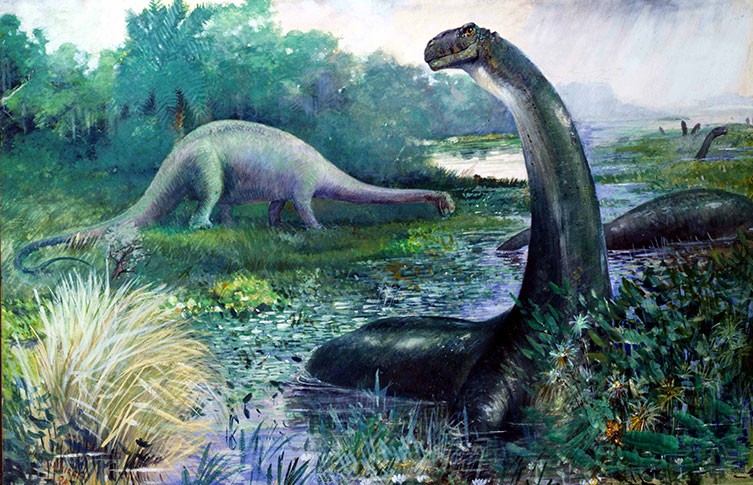Issue 54: Personal Library Science
How do we manage the libraries of us?

Dear Reader,
I've been meditating recently on when it is appropriate to declare a new field of study. How many rocks had to be categorized before we called it "geology"? How many cocktail parties had to happen between the physics and biology departments to make "astrobiology" a major you can study in? Why is "underwater basket weaving" such a persistent meme?
A field of study is officially defined as:
A field of study (also called a discipline) is a general topic of knowledge, learning, or research. In schools they are often called "subjects".
To take this definition further, I think to qualify as a field of study, we must have two things: a field that exists whether or not it is paid attention to, and the ability for humans to make knowledge gains through discovery and invention in the field.
Formatio Fossilium
Let's take paleontology as an example.
First, we need to establish the field itself. The field of fossils and flora from a bygone era were put into the Earth and calcified or mummified or frozen in time by some conglomeration of forces of nature, from volcanic activity to chaotic systems in weather patterns. Importantly, these events would have taken take place whether or nor humans were there to witness them happening (NB: if you want more on this, I wrote a bit about how I think empiricism is greatly overrated before).

The field itself exists, the tree in the forest fell with no one around to hear it.
Second, we need to be able to make conjectures about the field, be wrong about said conjectures, and improve with new hypotheses. In other words, the field needs to be study-able in the first place. If we were still stuck with our caveman brains, many ideas would simply be out of reach, forever. We need to be able to reason about something to make scientific claims about it in the first place.
It may seem strange that scientific instruments bring us closer to reality when in purely physical terms they only ever separate us further from it. But we observe nothing directly anyway. All observation is theory-laden. Likewise, whenever we make an error, it is an error in the explanation of something. That is why appearances can be deceptive, and it is also why we, and our instruments, can correct for that deceptiveness. The growth of knowledge consists of correcting misconceptions in our theories. Edison said that research is one per cent inspiration and ninety-nine per cent perspiration – but that is misleading, because people can apply creativity even to tasks that computers and other machines do uncreatively. So science is not mindless toil for which rare moments of discovery are the compensation: the toil can be creative, and fun, just as the discovery of new explanations is.
-- The Beginning of Infinity: Explanations That Transform the World
The story of our understanding of the brontosaurus deserves to be mentioned here.
Yes, No, Wait... Yes?
The brontosaurus, often beloved but questioned for over a century, is a large sauropod from the late Jurassic period. Initially discovered in the 1870s, it was later thought to be the same as apatosaurus (another dinosaur) due to similar fossils, leading to the name brontosaurus being dropped because apatosaurus was named first. However, a 2015 study re-examined their distinctions and reinstated brontosaurus as its own genus. This study analyzed numerous specimens and detailed anatomical traits, showing clear differences, particularly in build and neck structure, between the two dinosaurs. Despite some skepticism, many paleontologists now accept brontosaurus as distinct, celebrating its iconic status and unique features.

This anecdote about our updating understanding of paleontology checks off both of the constraints I established above. Paleontology has a field that exists outside of the realm of human meddling, and it can be reasoned about. So that's that.
The Rule
The generalizable rule for a field of study is that discoveries can be made. We need to be able to perceive something that exists, ask questions about it, and come up with answers that create follow up questions.
Now let's turn our attention to the task at hand.
(NB: This does leave engineering disciplines in a gray area, unless we consider the inventions made by engineers are "discoveries" of new uses of raw material, engineers are rarely, if ever, discovering natural phenomena like a physicist or chemist might.)
Library Science
Library science, also known as information science, is concerned with the organization, archival and retrieval of information.
First things first, let's test to see if library science fits our generalizable rule. Information, for example this very issue you are reading now, exists in the universe, by virtue of my having written it and you confirming it's existence outside of my own head-canon by reading it ("I saw Bigfoot, I swear!!"). That means that we can check off our first constraint, this information is a tree that indeed fell in the woods. These words, in this order, exist.
Now let's say one day in the future, this issue you are reading now ends up in an essay anthology book and is delivered to the NYPL front desk. It is the task of the librarians to decipher the information of the book and place the book where it belongs most – perhaps in a section about fields of study, or about library science itself (meta!). The librarians need to have some sort of system that they can develop that is more effective than blindly throwing books into a heap and hoping for the best. An example of this is the Dewey Decimal System.
Dewey or Not Dewey
The Dewey Decimal System is a way libraries organize books using numbers. Each subject gets a number from 000 to 999. It’s divided into 10 main classes, 100 divisions, and 1000 sections. For example, the 500s are for science, and the 820s for English literature.
The Dewey Decimal System is not the only organization system on the block. There's multiple systems including the LoC (Library of Congress), the UDC (Universal Decimal Classification) and the BBC (not the news network, the Bliss Bibliographic Classification). All these systems have pros and cons, each is a conjecture about how to organize information that comes into the library, each is improved upon as our knowledge of information itself evolves. For example, the work done by Claude Shannon and his peers ushered information science into a new era where boolean algebra could now be considered a first class information science tool.

Personal Library Science
Today, I am claiming that there is a new field of study in the world, an off shoot of library science, called personal library science. Personal Library Science is defined as: the discipline concerned with the organization, retrieval, and transformation of an individual's data.
The operative words here are: organization, transformation, and individual. Personal library science is focused on you and your data, not the existence of all data itself. More succinctly, personal library science is focused on your relationship with your information. How do we store information so that it useful at a later date? How do we transform our information into new valuable assets in different creative domains? How do we do all of this while being flexible enough for the idiosyncrasies, proclivities, likes and dislikes of eight billion distinct individuals? How do we chronicle the information diet of a single person as they learn new things, interact with the world at different phases in their life? How do we make sure we can pass down our best knowledge to generations below?
In sum, how do we manage the libraries of us?
Massive challenges, to be sure.
Informational Overwhelm
We can quantifiably say that people take in information every day: from podcasts, to short form video, to books from thousands of years ago, the information diet of human beings is varied, complex, and multifaceted. We then use this information to make critical judgement calls: to move cross country, to take or quit a job, to vote for politicians, to put cereal in before or after milk.
“Too many scholars think of research as purely a cerebral pursuit. If we do nothing with the knowledge we gain, then we have wasted our study. Books can store information better than we can—what we do that books cannot is interpret. So if one is not going to draw conclusions, then one might as well just leave the information in the texts.”
-- The Way of Kings (The Stormlight Archive, Book 1)
As such, it is of utmost importance that we create a middle ground language that we can make conjectures and developments against. We need to be able to understand the overlap between psychology, technology, publishing, the value of literacy, human creativity and our ability to make good judgement calls for ourselves and our communities.
I think personal library science is the tool that is up to the challenge.
Personal Library Science is defined as: the discipline concerned with the organization, retrieval, and transformation of an individual's data.
Up Next
Next week, we will discuss the current landscape of technology, and why now is the time for personal library science to be taken seriously. We will be looking at the history of personal computing and why it matters to personal library science. The week after that, we will be discussing commonplace books, philosophy of what human judgement means, and the responsibility of the reader.
Teaser
Tangent: Personal Computing
In 1975, the Altair 8800 was released. Widely considered the first personal computer, the critical advancement of computing was driven by affordability and programmability. Easier programming languages and lower cost made computers not massive time sharing leviathans owned only by defense departments and academia, but machines people could bring into their own homes changed the equation entirely...

Ye Olde Newsstand - Weekly Updates

i went on a family guy clips binge this week, and finished a book about the potency of humiliation in the status game
Thanks for reading, and see you next Sunday!
ars longa, vita brevis,
Bram





